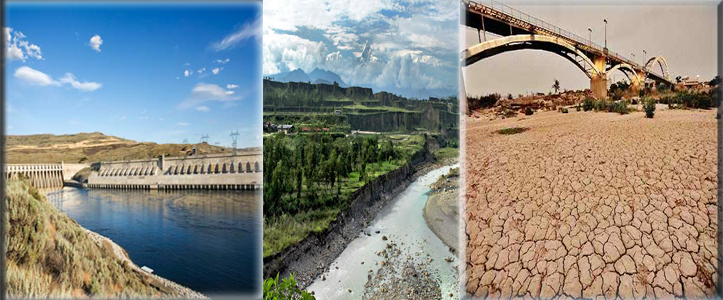Pakistan's
water scarcity

Most Pakistanis know
a lot about the country's energy crisis and its consequences
on the economy. However, hardly a handful know or even talks
about the much greater looming threat of water scarcity in
Pakistan, even though, the water crisis has much larger
consequences, it constitutes one of the biggest challenges
to Pakistan's survival. According to a recent report by
International Monetary Fund, Pakistan's per-capita water
availability has dropped significantly from 5,600 cubic
meters at the time of independence to the current level of
1,017 cubic meters. And it is not all thanks to population
growth.
Titled, Issues in
managing water challenges and policy instruments: Regional
perspective and case studies, the report forecasts that
per-capita water availability will decline further unless
Pakistan changes its current infrastructure and
institutional approaches to the problem.
Although Pakistan has massive glaciers, the country has only
one Indus system and its tributaries to take water from one
point to another.
The water availability in
Indus supply system is highly seasonal and 85 percent of
river flows occur during the June to September months. The
annual monsoon rain season also coincides with this period.
If the man-made problems are not enough, Pakistan is also
exposed to extreme weather conditions.
These conditions are
consisting of massive flooding and severe droughts. These
conditions play havoc with the country's agricultural,
livestock, and water infrastructure.
The case study argues that the significant cost of these
problems is attributed to lack of government interest in
building adequate storage capacity and control structures.
Pakistan has only 30-day
storage facility in its dams as compared to the 220-day
storage facility in India and 1000-days in Egypt.
The IMF has suggested Pakistan to conserve and sustain the
water use through better infrastructure.
It also argued that Pakistan should have a plan to bring the
agricultural sector under the tax net and to sustain water
use through a better cost recovery mechanism.
The study has strongly emphasized that there are both equity
and efficiency rationales for bringing agriculture within
the tax net. It argues that Pakistan's agriculture sector
consumed 95 percent of surface water annually.
However, the use of ground water has increased in recent
years, farmers tend to use subsidized water and electricity
tariffs have induced adoption and expansion of electric
pumps to tap groundwater at an alarming rate.
Approximately 60 percent of farm-gate-delivered water in
Punjab comes from tube wells. The study says that even with
all these benefits the agriculture contributes only 0.1
percent in total tax revenue even though it counts 21
percent of GDP.
The writers of the study believe that due to all these
reasons its important for agriculture to come under tax
umbrella.
The IMF report argues that the abiana or the water tax is
only 24 percent of annual maintenance and operating cost and
government is only able to collect 60 percent of total
receivables. This puts huge pressure on the government
budget.
The study also recommended that the pricing structure of
major corps should not be uniform because different crops
utilize different water level; for example rice utilizes 60
percent more water than cotton.
This lack of proper pricing creates excess use of water
during irrigation which results in poor water quality.
Currently, the 36 percent of groundwater is highly saline.
Finally, the report maintains that Pakistan needs a policy
change, with more focus on demand-side measures that would
promote water conservation and control of excessive
groundwater exploitation.
This demand-side approach cannot be possible without the
greater engagement of stakeholders at the local level in
water management and capacity-building of water management
institutions.
The federal government should encourage the provinces to
reform the agricultural taxation system within the context
of the next NFC awards.
June 2015
By BR
Research
Source: Business
Recorder